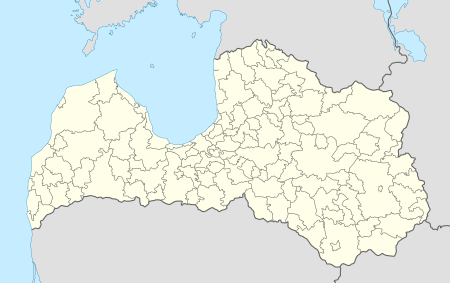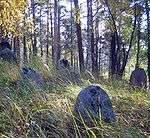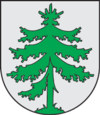Subate
| Subate | ||
|---|---|---|
| Town | ||
|
Subate Saint Michael Roman Catholic Church | ||
| ||
 Subate Location in Latvia | ||
| Coordinates: 56°01′N 25°54′E / 56.017°N 25.900°ECoordinates: 56°01′N 25°54′E / 56.017°N 25.900°E | ||
| Country |
| |
| Municipality | Ilūkste municipality | |
| Town rights | 1917 | |
| Population | ||
| • Total | 1,222 | |
| Time zone | EET (UTC+2) | |
| • Summer (DST) | EEST (UTC+3) | |
| Postal code | LV-5471 | |
| Calling code | +371 654 | |
Subate (![]() pronunciation ; German: Subbath), population 964, is a town in Latvia near the border with Lithuania. Subate is located in Selonia, the eastern part of the Zemgale region, 40 km west of Daugavpils.
pronunciation ; German: Subbath), population 964, is a town in Latvia near the border with Lithuania. Subate is located in Selonia, the eastern part of the Zemgale region, 40 km west of Daugavpils.

In 1570 Gotthard Kettler, the first Duke of Courland and Semigallia, granted the Baltic German Plater family, the dominant nobles throughout southeastern Latvia, an estate at the lake of Subate, and Alt-Subbath (Old Subbath) was established. After the Counter-Reformation, the Plater-Sybergs (Polish: Plater-Zyberk) converted to Catholicism, founding a mission with the intention of converting their serfs, and the Lutherans moved across the lake in protest, creating Neu-Subbath (New Subbath); the two towns were joined in 1894. By the late 19th century Jews composed about half of the population, and in 1914 there were ca. 2300 inhabitants. The town traded primarily in Lithuanian flax, but this trade languished after World War I. Almost all of Subate's Jews were brutally murdered in the Stahlecker phase of the Holocaust in 1941.
- Monument to soviet soldiers in Subate
 Lutheran church
Lutheran church- Old believers church in Subate
References
| Wikimedia Commons has media related to Subate. |
- Arveds Švābe, ed.: Latvju enciklopēdija. Stockholm: Trīs Zvaigznes, 1952-1953.
- Shtetl Focus: Subate. Retrieved 25. II. 2006.

